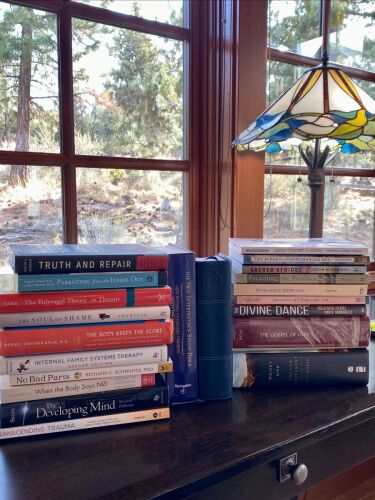 I recently shared a quote from Anne Lamott on Instagram that got exponentially more engagement than any other post. I’m pretty sure that’s because people didn’t read the whole thing.
I recently shared a quote from Anne Lamott on Instagram that got exponentially more engagement than any other post. I’m pretty sure that’s because people didn’t read the whole thing.
She said, “Perfectionism is the voice of the oppressor.” I think that’s all people needed to read to say, “YES!” Hit the heart button and move on.
I didn’t share the quote because I agree with her, but because I don’t.
While Anne is a patron saint of writers, I disagree with her about this. Oh, I understand that the drive for perfection can feel like an oppressor, like someone using harsh tactics to control you. But if we personify perfectionism as an oppressor, we will not invite her over for a glass of wine so we can become better friends. Instead, we are going to try to wrestle her into submission.
Have you tried to stifle perfectionistic impulses? I know I have. Perfectionism takes a lot of time—like when I edit things three times instead of once or try a few outfits instead of grabbing what feels comfy. It is also distracting; ruminating about faults and ways to avoid them takes energy away from more satisfying things.
Perfectionism is a strategy adopted by a part who’s trying to protect you from pain.
Despite the toll it takes, perfectionism is not an oppressor, and it is not an enemy. It is a strategy adopted by a member of your inner family who wants to protect you from criticism. The more energy this part of you expends, the more pain you hold from when you were blindsided by experiences that left you feeling defective. Those experiences leave a deposit of shame, and your dedicated perfectionist does not want you to be flooded with shame.
How do you feel about her now that you know she means well?
Her strategy makes sense when you realize she thinks if she controls how you look, what you say, and what you do, no one will be able to find fault with you. You won’t have to feel the rush of shame flooding your face and tightening your chest. You won’t remember that time way back in childhood when someone important made you feel like you could never be good enough. That’s when your inner perfectionist adopted this role. She, too, is young.
Are you willing to connect with the one using perfectionism to try to help you?
Check your heart. Is it open to her? Would you like to spend some time together?
Maybe you’re not quite there yet. That’s understandable. After all, if you Google Anne Lamott quotes and the first one that comes up (true story!) is “Perfectionism is the voice of the oppressor,” that’s evidence of the standard narrative that perfectionism is bad and even a threat. So no wonder there are parts of you who don’t want you to get near the one who has the thankless job of trying to control you.
You are bound to have parts who don’t like your inner perfectionist.
Typically, when we turn our attention inside, we notice more than one member of our inner family. Even if the protector using perfectionism as a strategy has a lot of energy and it’s easy to feel her, if you aren’t curious about why she’s working so hard and don’t want to connect with her, that means another part of you is present. If everyone on the outside is bashing perfectionism, you are likely to have parts of you who would like to get rid of her. They might point out that her tactics leave you feeling frustrated and overwhelmed.
Start there. Ask whoever is blocking your heart if they would be willing to give you some space. Reassure them that you aren’t promoting your inner perfectionist to CEO; you just want to get to know her.
Then ask yourself, “How am I feeling toward her now?” If you are curious, compassionate, or even neutral, there is space for connection. Invite her to share whatever she’d like you to know. This is probably the first time she’s ever felt welcomed and seen. If she’s an active member of your inner family, she will need consistent attention from you to believe that keeping you safe is not all up to her.
Cultivating a relationship builds trust.
Over time, when she shows up, appreciate her for her dedication. She will become more flexible, kinder, and more of a helper who won’t let you go to a meeting with spinach on your teeth. She will learn to trust you to decide whether how you are showing up in the world is, in fact, good enough.
Because it is.




Leave A Comment